Who Said ‘Eureka’ First And Why?
Conny Waters - AncientPages.com - When someone says "Eureka," it's because they have suddenly found or realized something or solved a problem. Scientists often shout Eureka when they have made a triumphant discovery.
Borrowed from ancient Greek: εὕρηκα the word Eureka means "I have found it!"
It can be interesting to know the origin of a famous word like "Eureka." Who said Eureka first, and why?
Archimedes by Domenico Fetti 1620 - Credit: Public Domain
The first documented "Eureka!" moment can be traced to the ancient Greek scientist Archimedes.
Archimedes was a great scholar from Syracuse, the ancient capital of Sicily, originally a Greek colony founded by Corinth in 734 BC.
"Not much is known about Archimedes, and information about him comes only from the introduction of his works and from numerous anecdotes often quoted by ancient historians.
He was the son of Fidias, an unknown astronomer about whom nothing is known. Even the year of Archimedes' birth (probably about 287 BC) has never been established with absolute certainty." 1
"Archimedes studied at the Alexandrian Museum from about 260 BC, before returning to his native Syracuse in Sicily to continue his work. To glance at a few of his achievements: his masterly mathematical proofs at times anticipated integral calculus; he invented by himself and developed to incredible elaboration the science of hydrostatics (the pressure and equilibrium of liquids at rest); he was the first man to work out accurately the value of pi; and he was the first to come up with the formula for measuring the volume of a sphere. Arguably, no other mathematician has ever made so many advances." 2
On one occasion, Archimedes was confronted with a scientific problem he could not solve quickly.
King Hieron II of Syracuse in Sicily gave a goldsmith a gold bar to make into a crown. The goldsmith delivered the pure gold crown to the King, but was suspicious, thinking the goldsmith had cheated him.
To find out if the crown he had received was made of solid gold or whether he had been palmed off with one containing silver, the King asked Archimedes to solve the problem.
Determining whether the crown was made of only gold was tricky without melting it down and, by doing so, destroying it.
Archimedes knew that gold and silver have different densities, meaning that a lump of gold will weigh about twice as much as a lump of silver the same size. The trouble was that no one knew how to work out the size of an irregularly shaped object like a crown. While pondering this conundrum, Archimedes went to the public baths to relax.
The answer came to him while he was taking a bath. Archimedes noticed that the water level rose when he got in, and it struck him that he could determine the gold density of the crown by weighing it in water.
Archimedes' principle states that any object, totally or partially immersed in a fluid, is buoyed up by a force equal to the weight of the fluid displaced by the object.
16th-century illustration of Archimedes in the bath, with the crown of King Hieron II at bottom right. Credit: Public Domain
To make a long story short, Archimedes discovered the hydrostatic law of buoyancy while bathing and playing with a rubber duck and a plastic boat. Eager to tell King Hieron II of Syracuse, the goldsmith had deceived him and, excited by his discovery, ran out into the streets of Syracuse, screaming, "Eureka!" which means "I found it."
He ran out into the streets of Syracuse, screaming, "Eureka!" which means "I found." Archimedes probably did not even notice that he was naked and on his way to the ruler.
"Thus, the great man became known to the city's inhabitants not only as a brilliant scholar but also as an exhibitionist." 1
It is difficult to say whether the story is true because there is no "proper evidence for it.
There is a series of such apocryphal tales in the history of science.
There is no evidence for Archimedes leaping from his bath, no evidence that Galileo dropped cannon balls from the leaning tower of Pisa (he knew of much better experiments than this already), no evidence that Newton had a realization about gravity while sitting under an apple tree, or that Watt invented the steam engine while watching a kettle boil (the steam engine had long been invented, and Watt's improvements to it had nothing to do with steam expanding)." 3
Updated on April 8, 2024
Written by Conny Waters – AncientPages.com Staff Writer
Copyright © AncientPages.com All rights reserved. This material may not be published, broadcast, rewritten or redistributed in whole or part without the express written permission of AncientPages.com
Expand for referencesMore From Ancient Pages
-
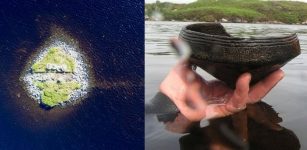 Crannogs – Artificial Islands In Scotland Are Older Than Stonehenge
Archaeology | Jun 17, 2019
Crannogs – Artificial Islands In Scotland Are Older Than Stonehenge
Archaeology | Jun 17, 2019 -
 The Face Of The Amarakarei – Remarkable Enormous Face Caved Into Stone Cliffs In Peru
Places | Nov 20, 2015
The Face Of The Amarakarei – Remarkable Enormous Face Caved Into Stone Cliffs In Peru
Places | Nov 20, 2015 -
 500-Year-Old Shiva Temple Constructed On Rock Without Foundation Pits Needs Repairs
News | Sep 7, 2015
500-Year-Old Shiva Temple Constructed On Rock Without Foundation Pits Needs Repairs
News | Sep 7, 2015 -
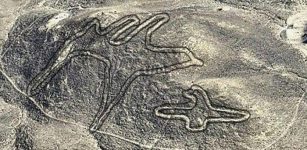 Nasca Lines: Researchers Identify 16 Bird Geoglyphs Drawn On Desert Plains Of Peru
Archaeology | Jun 23, 2019
Nasca Lines: Researchers Identify 16 Bird Geoglyphs Drawn On Desert Plains Of Peru
Archaeology | Jun 23, 2019 -
 Catastrophic Final Flooding Of Doggerland By The Storegga Tsunami – New Study Results
Archaeology | Dec 2, 2020
Catastrophic Final Flooding Of Doggerland By The Storegga Tsunami – New Study Results
Archaeology | Dec 2, 2020 -
 How Reliable Are Computer ‘Reconstructions’ Of Faces From Ancient Times?
Featured Stories | Sep 3, 2024
How Reliable Are Computer ‘Reconstructions’ Of Faces From Ancient Times?
Featured Stories | Sep 3, 2024 -
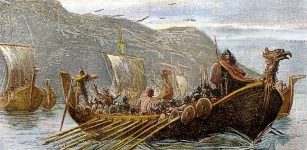 Norse Kingdom Of Dublin Was Founded By The Vikings In 839 A.D.
Ancient History Facts | Mar 15, 2016
Norse Kingdom Of Dublin Was Founded By The Vikings In 839 A.D.
Ancient History Facts | Mar 15, 2016 -
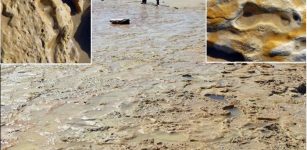 Recently Found ‘Neanderthal Footprints’ In the South Of Spain Could Be 275,000 Years Old
Featured Stories | Dec 1, 2022
Recently Found ‘Neanderthal Footprints’ In the South Of Spain Could Be 275,000 Years Old
Featured Stories | Dec 1, 2022 -
 Late Roman-Era Rooms, Offering Vessels Unearthed At Ancient City Of Antiocheia, Southern Türkiye
Archaeology | Oct 31, 2022
Late Roman-Era Rooms, Offering Vessels Unearthed At Ancient City Of Antiocheia, Southern Türkiye
Archaeology | Oct 31, 2022 -
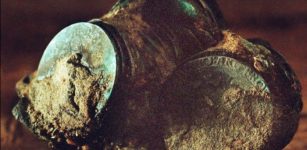 We Need To Look Underwater To Understand Our Past – New Study
Archaeology | Apr 14, 2023
We Need To Look Underwater To Understand Our Past – New Study
Archaeology | Apr 14, 2023 -
 Ancient Maps Reveal What Will Happen With Our Climate In The Future – Scientists Say
Archaeology | Oct 12, 2022
Ancient Maps Reveal What Will Happen With Our Climate In The Future – Scientists Say
Archaeology | Oct 12, 2022 -
 Rare Discovery: 530 Knuckle Bones ‘Astragali’ For Gaming And Divination Unearthed In Ancient City Of Maresha
Archaeology | Aug 16, 2022
Rare Discovery: 530 Knuckle Bones ‘Astragali’ For Gaming And Divination Unearthed In Ancient City Of Maresha
Archaeology | Aug 16, 2022 -
 Archaeological Evidence Of Human Presence In America 250,000 Years Ago?
Featured Stories | Mar 5, 2024
Archaeological Evidence Of Human Presence In America 250,000 Years Ago?
Featured Stories | Mar 5, 2024 -
 Unexplained Ancient Encounters With Shining Beings Who Appeared Out Nowhere – Who Were They?
Featured Stories | Dec 15, 2024
Unexplained Ancient Encounters With Shining Beings Who Appeared Out Nowhere – Who Were They?
Featured Stories | Dec 15, 2024 -
 Mysterious Sleeping Beauty Of Loulan Mummy Is Still Perfectly Preserved After 3,800 Years!
Civilizations | Oct 30, 2014
Mysterious Sleeping Beauty Of Loulan Mummy Is Still Perfectly Preserved After 3,800 Years!
Civilizations | Oct 30, 2014 -
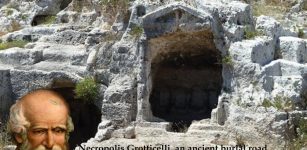 Archimedes From Syracuse – Master Of Science Whose Legacy Still Remains Powerful
Featured Stories | Sep 20, 2017
Archimedes From Syracuse – Master Of Science Whose Legacy Still Remains Powerful
Featured Stories | Sep 20, 2017 -
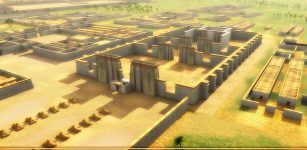 Ancient Egyptian Capital Tell El-Amarna Mapped Through Satellite Imagery System
Civilizations | Sep 11, 2015
Ancient Egyptian Capital Tell El-Amarna Mapped Through Satellite Imagery System
Civilizations | Sep 11, 2015 -
 Is The Tomb Of Genghis Khan Hidden And Protected In The Khentii Mountains Because Some Fear It’s Cursed?
Featured Stories | Jul 16, 2021
Is The Tomb Of Genghis Khan Hidden And Protected In The Khentii Mountains Because Some Fear It’s Cursed?
Featured Stories | Jul 16, 2021 -
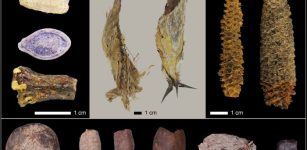 El Gigante Offers Lessons In Sustainability, Evolution And Human Adaptation, Courtesy Of The Holocene
Archaeology | Jun 29, 2023
El Gigante Offers Lessons In Sustainability, Evolution And Human Adaptation, Courtesy Of The Holocene
Archaeology | Jun 29, 2023 -
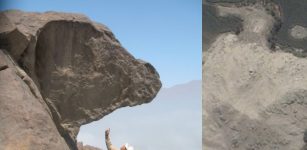 Rare Animal-Shaped Mounds Discovered In Peru
Archaeology | Apr 2, 2012
Rare Animal-Shaped Mounds Discovered In Peru
Archaeology | Apr 2, 2012


